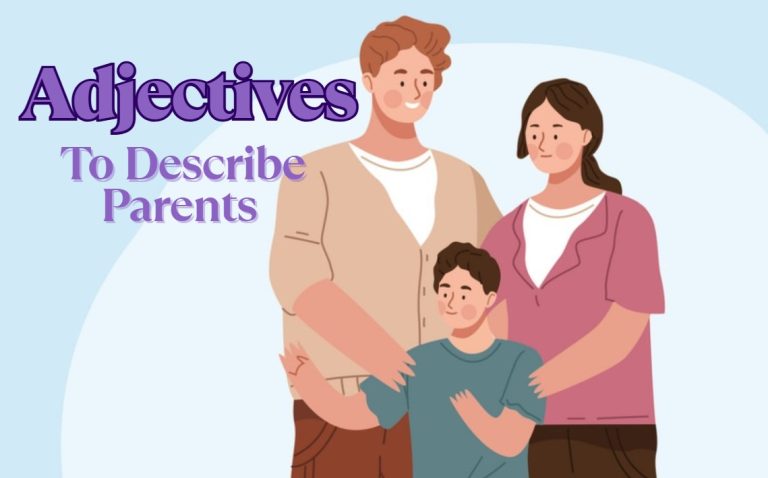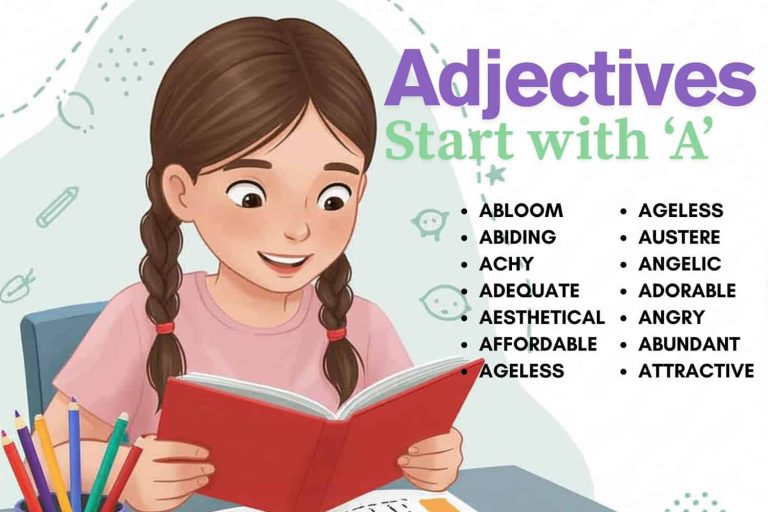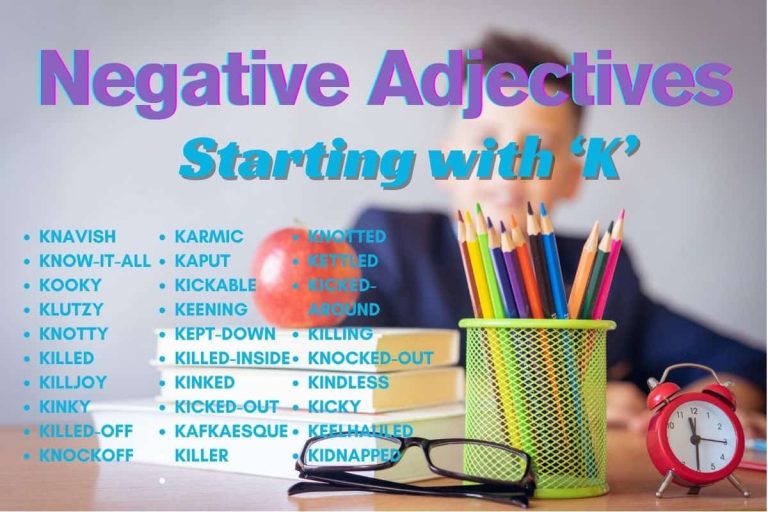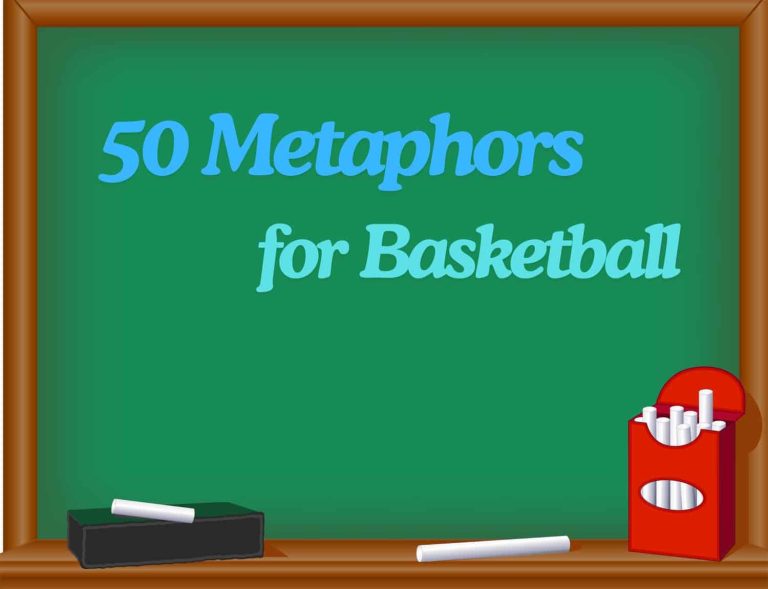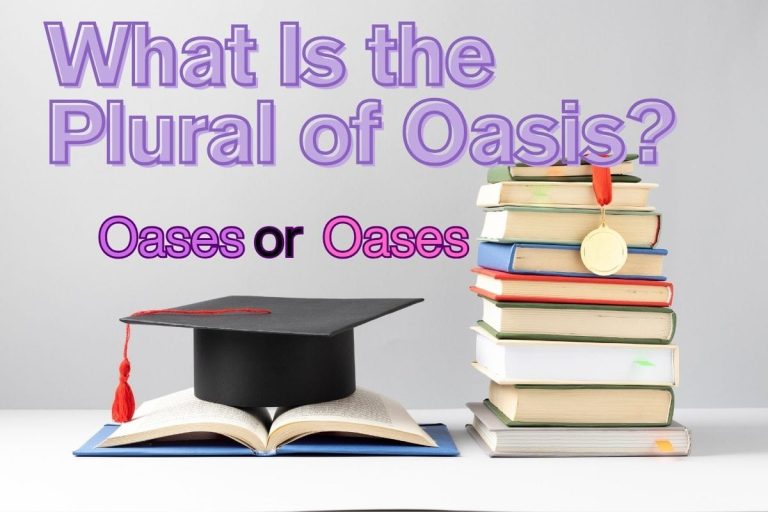Negative Adjectives Starting with R: 55+ Harsh & Critical Words
The English language is filled with rich vocabulary that helps us express not just positivity, but also criticism, concern, and complexity. When it comes to negative adjectives starting with R, a wide range of words can describe undesirable traits, emotions, or situations with precision.
Whether you’re a writer aiming to craft vivid characters, a speaker trying to express frustration clearly, or someone expanding their vocabulary, understanding these negative ‘R’ adjectives can be incredibly useful. These words add spice to your sentences and help you communicate more accurately and persuasively.
In this list, you’ll discover some of the most impactful and expressive negative adjectives beginning with the letter R, which is perfect for adding edge and honesty to your language.
Definition of Negative Adjectives for R words
Negative adjectives describe nouns in a way that implies a negative quality, absence, or undesirable characteristic. When these adjectives begin with the letter “r,” they often convey ideas of ruin, repulsion, or regression.
Structural Breakdown
Adjectives, in general, typically precede the noun they modify, or they follow a linking verb (such as is, are, was, were, seems, appears). Negative adjectives starting with “r” follow this same basic structure. For example:
- Directly before the noun: “The repulsive smell filled the room.”
- After a linking verb: “The situation is regrettable.”
Many of these adjectives are formed from verbs by adding suffixes such as -able, -ive, -ful, or -less. Understanding these suffixes can help in recognizing and understanding new words. For instance, “regret + -able” becomes “regrettable,” meaning something that causes regret.
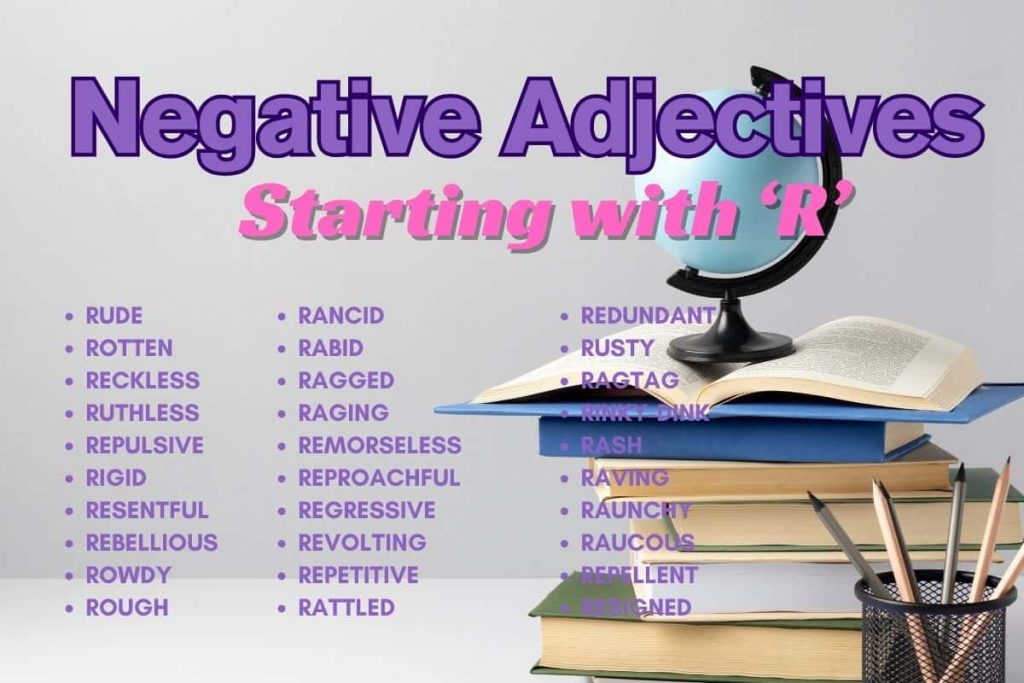
A List of Negative Adjectives Starting with ‘R’ and Examples
Here, I provide detailed examples of negative adjectives starting with “r,” categorized by whether they are inherently or contextually negative.
Each category includes a table with numerous examples to illustrate how these adjectives can be used in sentences.
Inherently Negative Examples
These adjectives possess a negative connotation regardless of the context in which they are used. Their meaning inherently implies something unfavorable or undesirable.
Examples include repulsive, reprehensible, and ruthless. These words always carry a negative weight and are rarely used in a positive or neutral sense.
This table showcases inherently negative adjectives starting with ‘r’. Each example sentence illustrates the negative connotation associated with the adjective.
| Adjective | Example Sentence |
|---|---|
| Repulsive | The repulsive odor emanating from the garbage bin made everyone nauseous. |
| Revolting | The revolting conditions in the prison led to widespread protests. |
| Reckless | His reckless driving caused a serious accident. |
| Ruthless | The ruthless dictator oppressed his people for decades. |
| Reprehensible | Their reprehensible behavior was condemned by the entire community. |
| Regressive | The new policies were seen as regressive, taking the country back to outdated practices. |
| Rancid | The milk had turned rancid and smelled terrible. |
| Risky | Investing in that company is too risky. |
| Rough | The sea was too rough for sailing. |
| Ruinous | The war had a ruinous effect on the country’s economy. |
| Rude | It’s rude to interrupt someone when they are speaking. |
| Rotten | The rotten apples attracted flies. |
| Rambunctious | The rambunctious children were difficult to control. |
| Ravenous | After a long hike, they were ravenous. |
| Resentful | He was resentful of his brother’s success. |
| Restless | The children grew restless during the long car ride. |
| Retaliatory | The company took retaliatory action against the whistleblower. |
| Rigorous | The training was rigorous and demanding. |
| Ridiculous | That’s a ridiculous idea. |
| Remorseless | The killer was remorseless and showed no regret. |
| Reactionary | The group was seen as reactionary, resisting all forms of progress. |
| Resistant | The bacteria became resistant to the antibiotic. |
| Repugnant | The thought of eating insects was repugnant to her. |
| Rhetorical | The question was rhetorical, not requiring an answer. |
| Rigid | The company had a rigid set of rules. |
| Rival | The two companies are rival firms. |
Contextually Negative Examples
These adjectives can have a negative connotation depending on the context. While not consistently negative, their usage in certain situations implies a negative attribute.
For example, the word rigid can be negative when describing someone’s personality (“a rigid person”), but neutral when describing a physical object (“a rigid structure”). The key is to understand how the adjective interacts with the noun it modifies.
| Adjective | Example Sentence | Context |
|---|---|---|
| Reserved | She is a reserved person, rarely expressing her emotions. | Negative: Implying emotional distance or aloofness. |
| Realistic | His realistic assessment of the situation was discouraging. | Negative: Implying a lack of optimism or hope. |
| Raw | The raw emotion in his voice was unsettling. | Negative: Implying vulnerability or uncontrolled feelings. |
| Regular | His regular complaints were starting to annoy everyone. | Negative: Implying monotony and negativity. |
| Related | The problems are related to poor management. | Negative: Implying a causal link to something negative. |
| Relative | The cost is relative to the benefits received. | Negative: Implying a lack of absolute value or certainty. |
| Remote | The possibility of success seems remote. | Negative: Implying a low probability or distance from a desired outcome. |
| Required | The required paperwork was overwhelming. | Negative: Implying burden or obligation. |
| Resultant | The resultant damage was extensive. | Negative: Implying a negative consequence. |
| Restricted | Her movements were restricted due to her injury. | Negative: Implying limitation or confinement. |
| Retroactive | The new tax law is retroactive, affecting past earnings. | Negative: Implying an unexpected or unwelcome change. |
| Revealing | The revealing documentary exposed the company’s unethical practices. | Negative: Implying exposure of something negative or scandalous. |
| Revised | The revised budget included significant cuts. | Negative: Implying reduction or loss. |
| Revolutionary | The revolutionary changes caused widespread disruption. | Negative: Implying upheaval or instability. |
| Romantic | His romantic ideals were out of touch with reality. | Negative: Implying impracticality or naivety. |
| Rooted | The problem is rooted in systemic inequality. | Negative: Implying a deep-seated and difficult-to-address issue. |
| Routine | The routine inspections revealed several safety violations. | Negative: Implying a discovery of something negative within a normal process. |
| Reasonable | It wasn’t reasonable to expect her to finish the project alone. | Negative: Implying that something is unfair or unrealistic. |
| Rational | His rational explanation for his actions was cold and unfeeling. | Negative: Implying a lack of empathy or emotion. |
| Related | The two incidents are related, suggesting a pattern of negligence. | Negative: Implying a connection between two negative events. |
| Relevant | The information was relevant to the case, but it was too late to introduce it. | Negative: Implying a missed opportunity or a problem that wasn’t addressed in time. |
| Resulting | The resulting chaos after the announcement was difficult to manage. | Negative: Implying a negative consequence or fallout. |
| Rebellious | The rebellious students were protesting the new policies. | Negative: Implying disorder or defiance. |
| Reflexive | His reflexive response was to deny any involvement. | Negative: Implying a lack of thought or consideration. |
| Representative | The statistics are representative of a larger problem. | Negative: Implying that a negative trend is widespread. |
Usage Rules
When using negative adjectives starting with “r,” it’s crucial to consider the context and the specific nuance you want to convey. Here are some key rules to keep in mind:
- Choose the right word: Pay attention to the subtle differences in meaning between similar adjectives. For example, “repulsive” implies a strong sense of disgust, while “reprehensible” suggests moral condemnation.
- Consider the impact: Negative adjectives can have a strong emotional impact. Use them judiciously and be mindful of the tone you are creating.
- Avoid overuse: Too many negative adjectives can make your writing or speech sound overly critical or pessimistic. Balance them with positive or neutral descriptions.
- Ensure agreement: The adjective must agree in number and gender with the noun it modifies (though this is less of a concern in English than in some other languages).
- Use with caution: Be careful when using these adjectives to describe people, as they can be offensive or hurtful. Choose your words carefully and be respectful of others’ feelings.
Exceptions and Special Cases: Some adjectives have idiomatic uses or specific collocations. For example, “rough” can mean difficult or unpleasant, but it can also describe the texture of a surface. Pay attention to these nuances and consult a dictionary or grammar guide when in doubt.
Common Mistakes
One common mistake is confusing adjectives with similar meanings but different connotations. For example, using “reckless” when “careless” is more appropriate, or vice versa.
Another mistake is using negative adjectives excessively, leading to an overly negative tone. It’s also important to ensure that the adjective accurately reflects the characteristic you want to describe; using a strong negative adjective when a milder one would suffice can be misleading or unfair.
| Incorrect | Correct | Explanation |
|---|---|---|
| The reckless mistake was easily fixed. | The careless mistake was easily fixed. | “Reckless” implies a deliberate disregard for consequences, while “careless” suggests a lack of attention. |
| The food was repulsive but I ate it anyway. | The food was unappetizing but I ate it anyway. | “Repulsive” is a very strong word and implies a strong sense of disgust. “Unappetizing” is milder and more appropriate in this context. |
| He is a repulsive person because he is quiet. | He is a reserved person, which some might find off-putting. | “Repulsive” implies moral condemnation, which is not appropriate simply because someone is quiet. “Reserved” is a more accurate and less judgmental description. |
| The resulting success was a disaster. | The unexpected success created new challenges. | “Resulting” refers to the outcome of something. Success cannot be a disaster, but it can create challenges. |
Practice Exercises
Test your understanding of negative adjectives starting with “r” with these exercises. Each exercise focuses on a different aspect of using these adjectives correctly.
Exercise 1: Sentence Completion
Fill in the blanks with the most appropriate negative adjective starting with “r” from the list below.
(repulsive, reckless, regrettable, ruthless, regressive)
| Question | Answer |
|---|---|
| 1. His _________ driving led to a multi-car pileup. | reckless |
| 2. The dictator was known for his _________ treatment of political opponents. | ruthless |
| 3. The _________ smell of the sewage plant made it difficult to breathe. | repulsive |
| 4. It is _________ that the project was delayed due to unforeseen circumstances. | regrettable |
| 5. The new policies were seen as _________, taking the country back to the dark ages. | regressive |
| 6. The politician’s _________ behavior cost him the election. | reprehensible |
| 7. The cheese had turned _________ and was inedible. | rancid |
| 8. Investing in that new venture seemed far too _________. | risky |
| 9. The sea was too _________ to go sailing. | rough |
| 10. The scandal had a _________ effect on his career. | ruinous |
Exercise 2: Error Correction
Identify and correct the errors in the following sentences.
(Each sentence contains one error related to the use of negative adjectives starting with “r”)
| Question | Answer |
|---|---|
| 1. Her ruthless behavior was actually very kind. | Her reserved behavior was actually very kind. |
| 2. The romantic assessment of the situation was encouraging. | The realistic assessment of the situation was discouraging. |
| 3. The resulting success was a complete failure. | The reckless investment was a complete failure. |
| 4. The routine discovery was very surprising and unusual. | The revealing discovery was very surprising and unusual. |
| 5. His rigid approach made him very flexible. | His rigid approach made him very inflexible. |
| 6. The rambunctious children were very calm and quiet. | The rambunctious children were difficult to control. |
| 7. The resentful employee was very happy with his job. | The resentful employee was unhappy with his job. |
| 8. The retaliatory action was meant to reward good behavior. | The retaliatory action was meant to punish bad behavior. |
| 9. The ridiculous idea was actually very sensible. | The ridiculous idea was absurd. |
| 10. The remorseless criminal showed a lot of remorse. | The remorseless criminal showed no remorse. |
Exercise 3: Synonym Replacement
Replace the underlined word in each sentence with a negative adjective starting with “r” that has a similar meaning.
(repulsive, reprehensible, reckless, ruinous, rigid)
| Question | Answer |
|---|---|
| 1. His careless actions caused a lot of damage. | His reckless actions caused a lot of damage. |
| 2. The dictator’s merciless regime oppressed the people for decades. | The dictator’s ruthless regime oppressed the people for decades. |
| 3. The smell was so disgusting that I had to leave the room. | The smell was so repulsive that I had to leave the room. |
| 4. Their behavior was deserving of condemnation and shocked everyone. | Their behavior was reprehensible and shocked everyone. |
| 5. The war had a devastating impact on the country’s economy. | The war had a ruinous impact on the country’s economy. |
| 6. The company’s inflexible policies made it difficult to adapt to change. | The company’s rigid policies made it difficult to adapt to change. |
| 7. The food was revolting, making me sick. | The food was repulsive, making me sick. |
| 8. His rash decision had severe consequences. | His reckless decision had severe consequences. |
| 9. The changes were seen as backward for the country. | The changes were seen as regressive for the country. |
| 10. It was unfortunate that the event had to be canceled. | It was regrettable that the event had to be canceled. |
people Also Asked Questions – FAQ
What is the difference between ‘repulsive’ and ‘revolting’?
‘Repulsive’ suggests a strong feeling of disgust that causes you to want to avoid something. ‘Revolting’ also implies disgust but often suggests a feeling of outrage or moral offense in addition to physical aversion. For instance, a repulsive smell might make you gag, while a revolting act might make you protest.
How do I avoid overusing negative adjectives?
Aim for balance in your writing and speech. Use negative adjectives sparingly and only when they are truly necessary to convey your intended meaning. Instead of relying solely on negative descriptions, try to provide specific details and evidence to support your claims. Also, consider using positive or neutral language to describe the opposite qualities or characteristics.
Can ‘reserved’ ever have a positive connotation?
Yes, ‘reserved’ can sometimes be seen as a positive trait, especially in certain cultures or contexts. It can imply politeness, discretion, or thoughtfulness. A reserved person might be seen as someone who is calm, composed, and less likely to act impulsively. However, it’s important to consider the context and the overall impression you want to create.
What are some alternatives to using ‘ruthless’?
Depending on the context, you could use words like ‘unyielding,’ ‘relentless,’ ‘callous,’ ‘heartless,’ or ‘merciless.’ Each of these words carries a slightly different nuance, so choose the one that best fits the specific situation. For example, ‘unyielding’ might suggest determination, while ‘callous’ implies a lack of empathy.
How does context affect the meaning of ‘rigid’?
When describing a person, ‘rigid’ usually implies inflexibility, stubbornness, or an unwillingness to compromise. This is generally seen as a negative trait. However, when describing a physical object, ‘rigid’ can simply mean strong, stable, or unyielding. For example, a rigid structure is one that can withstand a lot of force.
Is it ever appropriate to use ‘rancid’ in a figurative sense?
Yes, ‘rancid’ can be used figuratively to describe something that is morally corrupt, decayed, or offensive. For example, you might say that a political system is ‘rancid’ to indicate that it is plagued by corruption and injustice. However, use this word with caution, as it is quite strong and can be considered offensive.
How can I improve my understanding of nuanced adjective meanings?
Read widely and pay attention to how different adjectives are used in context. Consult a dictionary or thesaurus to explore the subtle differences in meaning between similar words. Practice using new adjectives in your own writing and speech, and ask for feedback from others. Over time, you will develop a better understanding of the nuances of adjective usage.
Conclusion
Mastering negative adjectives starting with “r” is a valuable step in enhancing your English vocabulary and communication skills. You can express yourself more accurately and effectively by understanding their meanings, usage rules, and common pitfalls.
Pay attention to context, choose your words carefully, and practice using these adjectives in a variety of situations. Remember that language learning is an ongoing process, and continuous practice is key to fluency and confidence.
This comprehensive guide has provided a solid foundation for understanding and using negative adjectives starting with “r.” Continue to explore the nuances of the English language, and don’t be afraid to experiment with new words and expressions.

